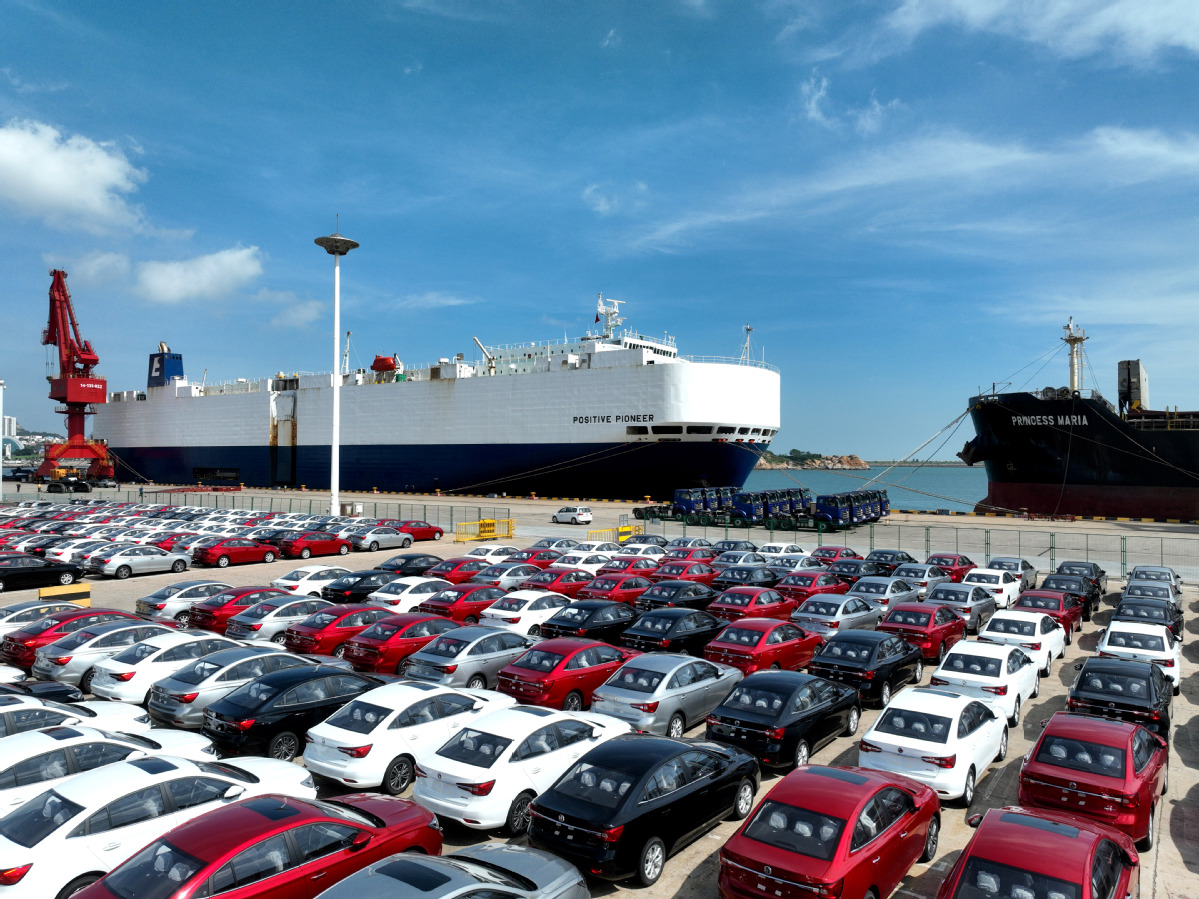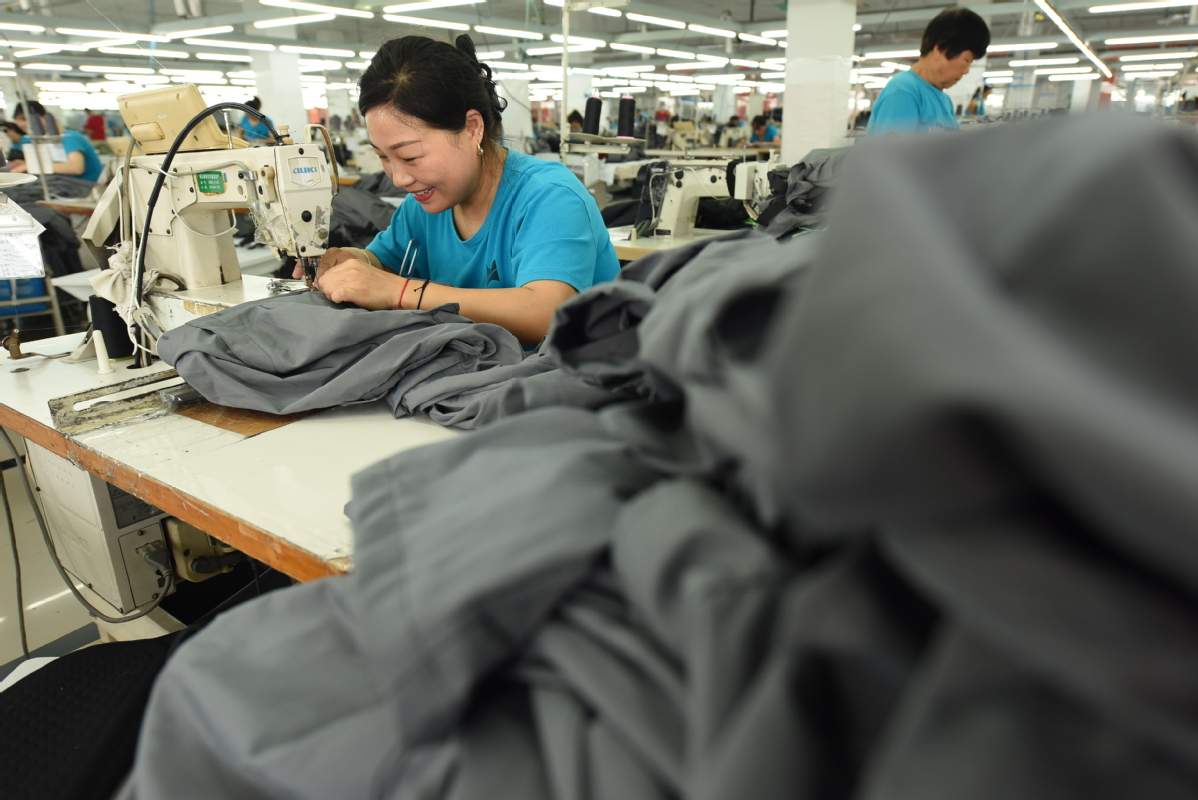E-commerce revs up sales for exporters


Chinese brands focus on online biz with popularity, reputations gaining steam
Chinese manufacturers have found a new way to rev up sales through cross-border e-commerce platforms, which have helped a wide variety of products, from garments to machinery equipment and charging piles, reach global buyers.
Sinomach-Hi International Equipment Co Ltd, a subsidiary of China National Machinery Industry Corp Ltd, a State-owned machinery conglomerate, said the sales of its excavators and loading machines have doubled on Alibaba.com, Chinese tech heavyweight Alibaba Group's online business-to-business marketplace for global wholesalers, in the past two years.
Wang Chuanming, chairman of the company, said exports of its products via digital platforms surpassed 11 million yuan ($1.5 million) in 2022, with about 80 percent of its online orders from Alibaba.com.
Sinomach-Hi International Equipment is among a number of Chinese export-oriented enterprises that are riding the cross-border e-commerce wave to secure new orders and boost their trade recovery. These cross-border online marketplaces have played a vital role in stabilizing China's foreign trade amid downward economic pressures and external uncertainties, experts said.
Online demand from overseas markets for products made in China surged 33 percent year-on-year in the first half of the year, data from Alibaba.com showed.
More than 90 percent of industries that cover products such as bathtubs, utility carts, new energy vehicles and lithium-ion batteries all witnessed their exports rise dramatically during the January-June period, the company said.
These China-made products have gained popularity in 91 percent of overseas markets, including Southeast Asia, Europe and the Americas, it said.
It noted that online demand for NEVs saw a five-fold increase, while the demand for golf carts skyrocketed by 257 percent year-on-year in the first six months. In addition, China-made machinery equipment, home furnishing materials, apparel, consumer electronics, and sports and entertainment products have been increasingly favored by overseas consumers.
Alibaba.com predicted that sales of NEVs, tailor-made printers, laser-cutting machines and excavators are expected to witness rapid growth among overseas shoppers in the second half of the year.
Qin Fen, who is in charge of industries and merchant business at Alibaba.com, said intelligent pet feeders, smart wearable devices, fast chargers, hair dryers and blenders are also favored by overseas consumers.
Cross-border e-commerce in China has made great strides in recent years. According to the General Administration of Customs, the import and export scale of the nation's cross-border e-commerce reached 2.11 trillion yuan in 2022, a year-on-year rise of 9.8 percent. E-commerce exports stood at 1.55 trillion yuan, up nearly 12 percent on a yearly basis.
China has stepped up efforts to boost the development of new forms of foreign trade as part of a broader push to promote high-quality economic growth.
In November, approval was granted for the establishment of comprehensive pilot zones for cross-border e-commerce in a total of 33 cities and regions in the latest attempt to boost foreign trade growth. This is the seventh batch of such pilot areas, which now total 165 nationwide.
Data from US tech company Amazon showed that Chinese vendors sold billions of commodities to global consumers through the company's 18 overseas marketplaces last year. The number of Chinese sellers using Amazon's logistics services rose by more than 20 percent year-on-year, with their sales revenue achieving double-digit growth.
The number of Chinese brand owners on Amazon surged nearly three times in the past three years, with their turnover posting double-digit growth in 2022.Meanwhile, Chinese sellers have shown diversification trends in terms of merchandise categories and technological innovation as well as brands and business types.
Cindy Tai, Amazon vice-president and head of Amazon Global Selling Asia, said Chinese sellers are paying more attention to building brands and expanding their presence in overseas markets while emphasizing that cross-border e-commerce is an unstoppable trend that helps drive the transformation from "Made in China" to "Brands from China".
Cui Lili, director of the Shanghai University of Finance and Economics' Institute of E-commerce, said the popularity of products made in China in overseas markets demonstrates that these cost-effective commodities have gained recognition and raised brand reputations abroad in recent years.
"Nowadays, China's major online shopping festivals have become more international, exerting greater influence on overseas buyers who are increasingly willing to buy Chinese brands via cross-border e-commerce platforms," Cui said.
"As a new form of foreign trade, cross-border e-commerce has witnessed rapid growth during the COVID-19 pandemic and become an important driving force for maintaining the stability of foreign trade," said Zhang Zhouping, a senior analyst of B2B and cross-border activities at the Internet Economy Institute, a domestic consultancy.
It will have a profound impact on the transformation and upgrading of foreign trade in China, Zhang said, adding that an increasing number of Chinese enterprises have attached great importance to cross-border e-commerce as it plays an important part in bolstering traditional foreign trade enterprises to build up new brands.

Moreover, a string of Chinese cross-border e-commerce platforms are ratcheting up efforts to expand their overseas presence amid a broader drive to cultivate new users and diversify revenue sources.
Online discounter PDD Holdings, the parent company of Chinese e-commerce platform Pinduoduo, recently launched its cross-border e-commerce platform Temu in South Korea and Japan as part of its strategy to serve price-conscious consumers.
Temu offers clothing, electronic products, jewelry, shoes, handbags, cosmetics and baby products at competitive prices since it was first rolled out in the United States last September. So far, it has entered more than 20 countries in North America, Europe and Asia.
Pinduoduo said it plans to invest 10 billion yuan to help China's manufacturing enterprises stretch their global reach. The first phase of the initiative will help 100 Chinese brands go global and assist 10,000 manufacturers in connecting directly with overseas markets.
Fast-fashion online retailer Shein has announced further expansion of its product categories through collaborations with selected global brands and third-party sellers, to fulfill customers' increasing demands for diversified products.
Customers can now buy products that go beyond fashion and apparel, including categories like home appliances such as portable washing machines and smart home products like remote-controlled lighting.
The company has announced that it will officially launch an integrated marketplace in Mexico, following Brazil and the US, that offers products from third-party sellers alongside Shein's own products, while launches in Germany, Spain, France and Italy will soon follow suit.
As growth of domestic e-commerce enterprises is slowing, China's e-commerce platforms are trying to pursue new revenue sources through expansion in overseas markets, said Zhang of the Internet Economy Institute.
Zhang said competition among cross-border e-commerce companies is expected to focus on supply chain construction. "The core competitiveness of Temu and Shein lies in products with competitive prices and fast delivery, which are highly dependent on the establishment of the supply chain."
He noted that Chinese online retailers who are making inroads into overseas markets should learn about the preferences of local consumers and relevant laws, regulations and quality standards, as well as seek development strategies to differentiate themselves from competitors.
Chen Tao, an analyst at internet consultancy Analysys in Beijing, said price, quality and service are the most important factors consumers consider when buying products, and cost-effective goods have been attractive to consumers against the backdrop of a gloomy economic outlook.
Meanwhile, Chinese cross-border e-commerce platforms will face intense competition from established players in overseas markets such as Amazon and Ali-Express, Alibaba's cross-border platform, Chen said, adding that the platform, which provides good shopping experiences and service, will gain an advantage in the fierce competition.




































